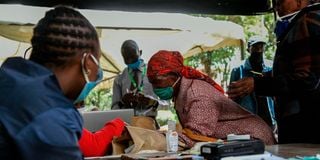Inua Jamii beneficiaries to get Sh2,000 stipend on mobile phone

An old woman receives her Inua Jamii stipend.
Beneficiaries of the government's various social protection cash transfers will from December receive their monthly stipend directly on their mobile phones after more than a year of waiting.
This comes as the government says it is streamlining the Inua Jamii programme by weeding out dead beneficiaries whose caregivers are still receiving stipends without disclosure.
The programme, which provides cash transfers to the most vulnerable members of society, targets orphans and vulnerable children, people with severe disabilities and the elderly.
Labour and Social Protection Cabinet Secretary Alfred Mutua told senators on Wednesday that by December 1, 2024, the ministry will introduce digital transfer of the stipend to cut the long chase for the Sh2,000.
The move, he said, will see the over one million beneficiaries receive their monthly stipends through the M-Pesa platform instead of going to the bank or agents.
Currently, he noted, beneficiaries of the programmes are forced to travel to places to access their stipends from registered financial institutions, noting that the movement is a major challenge, especially for the elderly and those with disabilities.
“So we are rolling out a programme by December 1, 2024. We are going to ensure that all the money will be transferred directly to the phones or designated M-Pesa accounts of the recipients so they don’t have to leave the comfort of their homes, spend some money to go and wait a whole day to receive the Sh2,000,” said Dr Mutua.
During last year’s Jamhuri Day celebrations, President William Ruto ordered the shift to save the beneficiaries from the hassle of long distances, costs and inconveniences to access the cash.
Later in September, the Principal Secretary for Social Protection and Senior Citizens Affairs, Joseph Motari, said beneficiaries would start receiving their monthly stipend through mobile phones within six months.
He said the government was working on structures to ensure that the move was implemented within the six months.
CS Mutua told senators that the contracts of the banks on board to transfer the money were coming to an end as the government was moving to digital platforms to transfer the money.
He said the move will relieve those registered with Inua Jamii, orphans, vulnerable children and persons with disabilities from the challenges of visiting financial institutions to access their money.
About six banks, which had been contracted to pay the beneficiaries, sub-contracted bank agents in the wards and sub-counties to disburse the funds to the beneficiaries.
“Currently, people go in the morning to pick up their money from banks or agents. They wake up in the morning, get a boda boda or a car and travel long distances and they line up the whole day waiting to receive their money, which is not fair,” said the CS.
“You don’t have someone spending Sh500 to travel and another Sh200 to eat and then you are giving them Sh2,000. Already, the money is gone,” he added.
In January, the government began digitally registering beneficiaries of the programme and paying them via M-Pesa.
The programme, which started with the elderly in 2007 with just 300 beneficiaries, currently has more than 1.2 million beneficiaries, with those aged 70 and above accounting for 833,129.
The 2019 census estimates that the elderly make up six percent or 2.7 million people. However, the number is expected to rise to 10.3 percent by 2050.
Nevertheless, the senators grilled Dr Mutua on the mechanisms put in place by the government to ensure that only genuine beneficiaries receive the monthly stipend.
Nominated Senator Catherine Mumma challenged the minister to make the register of beneficiaries available for scrutiny.
“Where can we get the register to ensure that those who genuinely need to access social protection are the ones accessing it? What mechanism have you put in place to ensure only the correct people are receiving the social protection funds and the funds are equitably distributed among the beneficiaries?” asked Ms Mumma.
Kirinyaga Senator James Murango pressed the CS to explain why the government had failed to use available data on Kenyans in its possession to register beneficiaries instead of spending more money on a new registration exercise.
In his response, Dr Mutua said Parliament had passed a Data Protection Act that does not allow the government to disclose people's private information.
He said the government identifies beneficiaries in terms of age, disability and vulnerability using enumerators who go to the field.
However, he admitted that there have been cases where caregivers of deceased beneficiaries have continued to receive the money.
“But we are working on streamlining this issue by moving to a single registry. We have started getting the records from the Interior ministry using enumerators to review and verify the status of the beneficiaries, their present location and so on, to address duplication of payment to beneficiaries,” said Dr Mutua.





